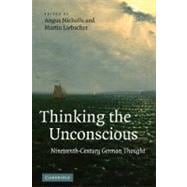
Note: Supplemental materials are not guaranteed with Rental or Used book purchases.
Purchase Benefits
What is included with this book?
| Notes on contributors | p. vii |
| Introduction: thinking the unconscious | p. 1 |
| The unconscious from the Storm and Stress to Weimar classicism: the dialectic of time and pleasure | p. 26 |
| The philosophical significance of Schelling's conception of the unconscious | p. 57 |
| The scientific unconscious: Goethe's post-Kantian epistemology | p. 87 |
| The hidden agent of the self: towards an aesthetic theory of the non-conscious in German romanticism | p. 121 |
| The real essence of human beings: Schopenhauer and the unconscious will | p. 140 |
| Carl Gustav Carus and the science of the unconscious | p. 156 |
| Eduard von Hartmann's Philosophy of the Unconscious | p. 173 |
| Gustav Theodor Fechner and the unconscious | p. 200 |
| Friedrich Nietzsche's perspectives on the unconscious | p. 241 |
| Freud and nineteenth-century philosophical sources on the unconscious | p. 261 |
| Epilogue: the "optional" unconscious | p. 287 |
| Works cited | p. 297 |
| Index | p. 324 |
| Table of Contents provided by Ingram. All Rights Reserved. |
The New copy of this book will include any supplemental materials advertised. Please check the title of the book to determine if it should include any access cards, study guides, lab manuals, CDs, etc.
The Used, Rental and eBook copies of this book are not guaranteed to include any supplemental materials. Typically, only the book itself is included. This is true even if the title states it includes any access cards, study guides, lab manuals, CDs, etc.